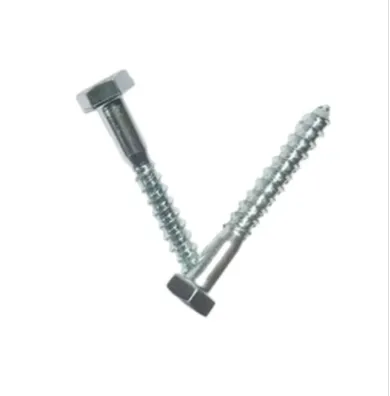Feb . 18, 2025 10:26 Back to list
Factory Wholesale Carbon Steel Galvanized White Zinc M8X50 DIN603 Carriage Bolt
Mechanical types of bolts play a crucial role in numerous construction and manufacturing applications. They are essential components that ensure structural integrity, safety, and reliability across various industries. Understanding the different types of mechanical bolts, their applications, and benefits can significantly aid in choosing the right bolt for any specific project.
For applications involving machinery, consider the use of machine bolts. These bolts have a uniform diameter and thread pitch, making them compatible with tapped holes or nuts in metal structures. Machine bolts are critical in vehicle assembly, industrial machinery, and other instances where precision and strength are paramount. They ensure tight, vibration-resistant connections, critical to maintaining the integrity and function of mechanical systems. The choice of bolt material is equally important in mechanical applications. Stainless steel bolts offer corrosion resistance, ideal for environments exposed to moisture or harsh chemicals. Carbon steel bolts are favored for their high tensile strength and cost-effectiveness in less corrosive settings. When greater strength and resistance to extreme temperatures are required, alloy steel bolts are the preferred choice. Understanding the impacts of environmental conditions on bolt performance is critical. Bolts exposed to a corrosive atmosphere, under constant vibration, or required to bear dynamic loads need to have specific properties such as anti-corrosion coatings or flexible yet durable materials. Selecting bolts tested for these conditions will enhance safety and longevity. Moreover, while selecting the appropriate bolt, consider the importance of thread type. Coarse threads are generally more durable and quicker to assemble, ideal for working with brittle materials like wood. Fine threads, conversely, provide greater tensile strength due to the larger stress area, suitable for precision applications in machinery and automotive assemblies. Finally, proper installation techniques are vital to maximizing a bolt's performance. Ensure using the correctly sized tools to avoid improper tightening that could lead to bolt failure. Understanding torque specifications and following recommended installation practices will preserve the bolt's integrity and extend the lifespan of the assembly. Investing in the right type of mechanical bolt for each application is fundamental. It guarantees the safety, efficiency, and sustainability of the construction or manufacturing project. As technology advances, the development of smarter, more adaptable bolts continues, offering enhanced performance and environmentally friendly options to meet the ever-evolving demands of industries around the globe.


For applications involving machinery, consider the use of machine bolts. These bolts have a uniform diameter and thread pitch, making them compatible with tapped holes or nuts in metal structures. Machine bolts are critical in vehicle assembly, industrial machinery, and other instances where precision and strength are paramount. They ensure tight, vibration-resistant connections, critical to maintaining the integrity and function of mechanical systems. The choice of bolt material is equally important in mechanical applications. Stainless steel bolts offer corrosion resistance, ideal for environments exposed to moisture or harsh chemicals. Carbon steel bolts are favored for their high tensile strength and cost-effectiveness in less corrosive settings. When greater strength and resistance to extreme temperatures are required, alloy steel bolts are the preferred choice. Understanding the impacts of environmental conditions on bolt performance is critical. Bolts exposed to a corrosive atmosphere, under constant vibration, or required to bear dynamic loads need to have specific properties such as anti-corrosion coatings or flexible yet durable materials. Selecting bolts tested for these conditions will enhance safety and longevity. Moreover, while selecting the appropriate bolt, consider the importance of thread type. Coarse threads are generally more durable and quicker to assemble, ideal for working with brittle materials like wood. Fine threads, conversely, provide greater tensile strength due to the larger stress area, suitable for precision applications in machinery and automotive assemblies. Finally, proper installation techniques are vital to maximizing a bolt's performance. Ensure using the correctly sized tools to avoid improper tightening that could lead to bolt failure. Understanding torque specifications and following recommended installation practices will preserve the bolt's integrity and extend the lifespan of the assembly. Investing in the right type of mechanical bolt for each application is fundamental. It guarantees the safety, efficiency, and sustainability of the construction or manufacturing project. As technology advances, the development of smarter, more adaptable bolts continues, offering enhanced performance and environmentally friendly options to meet the ever-evolving demands of industries around the globe.


